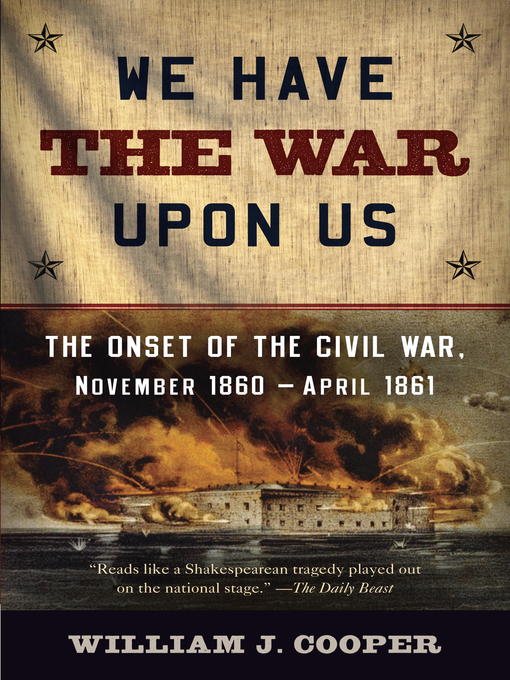
We Have the War Upon Us
The Onset of the Civil War, November 1860-April 1861
کتاب های مرتبط
- اطلاعات
- نقد و بررسی
- دیدگاه کاربران
نقد و بررسی

June 18, 2012
In this dry yet informative volume, noted Southern historian Cooper (Jefferson Davis, American) focuses on a crucial five months of political wrangling and behind-the-scenes negotiations leading up to the Civil War. With then President Buchanan and President-elect Lincoln caught in the middle, and the Southern Democrats squaring off against the Northern Republicans, it became obvious that there was a fundamental disconnect among the states and that war was increasingly unavoidable. Cooper leaves no stone unturned as he explores the hard decisions and compromises leading up to the war, beginning with the way Lincoln’s election changed the face of American politics: representing a new party, he was also the first president with no Southern constituency, and, Cooper says, he had little understanding of the South. With the radical faction known as fire-eaters working to encourage secession, and Buchanan forced to make ever more desperate choices, it becomes clear through Cooper’s narrative that the outbreak of the Civil War was not sudden, but the result of thousands of tiny moments. Cooper’s research is thorough and unbiased, assigning credit and blame on all sides. Cooper’s scholarly tone may not appeal to casual readers, but Civil War buffs will appreciate the expert examination of the period. Illus., maps.

July 15, 2012
Cooper (History/Louisiana State Univ.; Jefferson Davis and the Civil War Era, 2008, etc.) shares his encyclopedic knowledge of the American South and the Civil War as he exposes the players who drew the country into war. President James Buchanan's attempts to diffuse the tensions only postponed a crisis. After South Carolina's secession, he concluded a gentlemen's agreement with Gov. Francis Pickens not to reinforce Fort Sumter in Charleston Harbor as long as there was no interference. Though historians often claim that slavery was not the true cause of the war, the Southern states demanded their right to reclaim escaped slaves and the rights of the new territories to establish themselves as slave or free. Abraham Lincoln was adamantly against extending the right of slavery in the territories, a true deal breaker for the South. The Republican Party, rejoicing upon gaining the White House in November 1860, was determined to control the South, and they were unwilling to compromise, thwarting every attempt in Congress and using debate and delay methods that are all too familiar today. The Democratic Congress stalwartly attempted to find resolution, with committees in both houses, but again the Republicans used all the instruments of democracy to frustrate success. There were countless attempts to save the Union, including the Crittenden Compromise, the tireless work of William Seward, and the proposal of an amendment to guarantee slavery as it existed. Each had a possibility of success but suffered reverses, delays and impenetrable opposition. Drawing on his wide knowledge of the time period, Cooper clearly enumerates the many ways the Civil War could have been avoided and how many people were clueless as to the real threat, especially Lincoln. Illuminating Civil War history from an expert in the field.
COPYRIGHT(2012) Kirkus Reviews, ALL RIGHTS RESERVED.

October 1, 2012
Cooper (history, Louisiana State Univ.; Jefferson Davis, American) posits that the Civil War came about because Lincoln and Republican radicals refused to engage in serious compromise efforts with Southern moderates and "fire-eaters," referring primarily to the Southern demand for the territorial expansion of slavery. In fact, Lincoln and the Republicans consistently stated that they were willing to compromise over every other divisive issue except slavery in the territories. Cooper contends that the territorial expansion of slavery wasn't practically important because slavery would not exist in Western climates and, therefore, Republicans should not have been so intransigent. This only leads to the question, why did the South demand it if it was unimportant? Further, Cooper argues that Lincoln should not have used force to coerce Southern states back into the Union and should instead have sought reconciliation by giving in to all Southern demands. It's difficult to see how Lincoln could have survived politically if he had completely abandoned the platform on which he was elected. Nor does Cooper explain how reunion could have taken place since secessionists made clear that the break was permanent. VERDICT Most pro-Confederate books downplay the role of slavery in the conflict. Cooper calls slavery a moral wrong, while making it the central issue. Objective historians may want to read this book, but they are likely to find that Cooper's argument uses flawed logic.--MF
Copyright 2012 Library Journal, LLC Used with permission.

September 1, 2012
In this meticulous study of the secession crisis of 186061, the author of Jefferson Davis, American (2000) explores the failure of compromise to prevail on the question of slavery, as it had previously in American history. Lining up the political groupings involved, from fire-eaters (Southerners demanding immediate secession) to Southern unionists to the factions making up the victorious Republican Party, Cooper narrates their activities in various arenas, starting with Congress. From his accounts of the parliamentary demise of compromise proposals, often on the rock of Republican resistance to allowing slavery in the territories, Cooper shifts scenes to secession conventions in Southern states, in several of which unionists initially defeated secessionists. The genuine strength of pro-slavery Southern unionists attracts Cooper's most in-depth analysis, as Lincoln counted on them to derail secession. Lincoln, Cooper argues, understood their political dilemmas but poorly and would not, for reasons of Republican unity and antislavery principle, concede what might have strengthened unionists' hands against fire-eaterspermitting slavery in the territories. Politically detailed, astutely argued, Cooper's work signally contributes to the history of the start of the Civil War.(Reprinted with permission of Booklist, copyright 2012, American Library Association.)

























دیدگاه کاربران